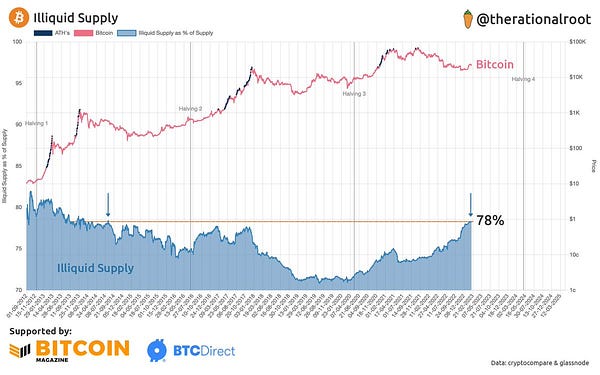Riding The Wave News Summary 120
Crypto bank Silvergate ranks as the second most-shorted stock on Wall Street, What investors need to know about ‘staking,’ the passive income opportunity at the center of crypto’s latest regulation
Welcome to Riding The Wave. If you have questions or feedback, please reply to this email. If you are new to the Newsletter, please check out what we provide on our about page and consider subscribing. Within the Newsletter, I provide News Summaries, Weekly Status Updates, & Deep Dive Articles on Specific Topics (Ex: How do I pick which coins/tokens to buy?). More details here
News
Table of Contents
Tweets
Crypto bank Silvergate ranks as the second most-shorted stock on Wall Street
SEC Chief Gensler Warns Crypto Firms to Comply With Rules After Kraken Shutters US Staking Program
Are the Remaining Crypto Giants Staring Down the Barrel of the US Government’s Gun?
Tweets








Crypto bank Silvergate ranks as the second most-shorted stock on Wall Street
Crypto bank Silvergate Capital Corp. stands in the second position as most-shorted stock in the United States, with over 72.5% of its shares shorted, according to the latest Short Interest Reporting from Feb. 9.
The Financial Industry Regulatory Authority (FINRA) collects and publishes twice a month short interest positions of all equity securities. A short position means investors and traders believe the price of a security, such as a stock, will decrease in value. A short seller profits from the price decline of a security.
At the time of writing, Silvergate stock (SI) is down over 87% in the past twelve months. The bearish sentiment on Silvergate stems from its recent earnings report and legal battles the company faces over its relationship with bankrupt firms FTX and Alameda Research.
The bank faces probes and lawsuits in the U.S. for allegedly aiding FTX on fraudulent activities, including lending and commingling user's funds. The company has been accused of "furthering FTX's investment fraud", while shareholders claim Silvergate violated the 1934 Securities Exchange Act. A Justice Department investigation is currently ongoing over the bank's role in FTX businesses.
What investors need to know about ‘staking,’ the passive income opportunity at the center of crypto’s latest regulation scare
Not six months ago, ether led a recovery in cryptocurrency prices ahead of a big tech upgrade that would make something called “staking” available to crypto investors.
Most people have hardly wrapped their heads around the concept, but now, the price of ether is falling amid mounting fears that the Securities and Exchange Commission could crack down on it.
On Thursday, Kraken, one of the largest crypto exchanges in the world, closed its staking program in a $30 million settlement with the SEC, which said the company failed to register the offer and sale of its crypto staking-as-a-service program.
The night before, Coinbase CEO Brian Armstrong warned his Twitter followers that the securities regulator may want more broadly to end staking for U.S. retail customers.
“This should put everyone on notice in this marketplace,” SEC Chair Gary Gensler told CNBC’s “Squawk Box” Friday morning. “Whether you call it lend, earn, yield, whether you offer an annual percentage yield – that doesn’t matter. If someone is taking [customer] tokens and transferring to their platform, the platform controls it.”
Staking has widely been seen as a catalyst for mainstream adoption of crypto and a big revenue opportunity for exchanges like Coinbase. A clampdown on staking, and staking services, could have damaging consequences not just for those exchanges, but also Ethereum and other proof-of-stake blockchain networks. To understand why, it helps to have a basic understanding of the activity in question.
Staking is sometimes referred to as the crypto version of a high-interest savings account, but there’s a major flaw in that comparison: crypto networks are decentralized, and banking institutions are not.
Earning interest through staking is not the same thing as earning interest from a high annual percentage yield offered by a centralized platform like those that ran into trouble last year, like BlockFi and Celsius, or Gemini just last month. Those offerings really were more akin to a savings account: people would deposit their crypto with centralized entities that lent those funds out and promised rewards to the depositors in interest (of up to 20% in some cases). Rewards vary by network but generally, the more you stake, the more you earn.
By contrast, when you stake your crypto, you are contributing to the proof-of-stake system that keeps decentralized networks like Ethereum running and secure; you become a “validator” on the blockchain, meaning you verify and process the transactions as they come through, if chosen by the algorithm. The selection is semi-random – the more crypto you stake, the more likely you’ll be chosen as a validator.
SEC Chief Gensler Warns Crypto Firms to Comply With Rules After Kraken Shutters US Staking Program
Keep reading with a 7-day free trial
Subscribe to Riding The Wave to keep reading this post and get 7 days of free access to the full post archives.






